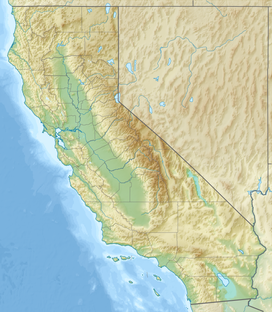| Mount Hopkins | |
|---|---|
 Mount Hopkins southeast aspect | |
| Highest point | |
| Elevation | 12,304 ft (3,750 m) NGVD 29[1] |
| Prominence | 424 ft (129 m)[1] |
| Coordinates | 37°27′50″N 118°48′46″W / 37.4638238°N 118.8129018°W[2] |
| Geography | |
| Parent range | Sierra Nevada |
| Topo map | USGS Mount Abbot |
| Climbing | |
| First ascent | 1934 by David Brower, Norman Clyde, and Hervey Voge[3] |
| Easiest route | Hike from the east[3] |
Mount Hopkins is a mountain in the John Muir Wilderness north of Kings Canyon National Park. It is one of four peaks that surround Pioneer Basin, 1.4 miles (2.3 km) south-southeast of Mount Crocker, 2 miles (3.2 km) west-southwest of Mount Huntington, and 2 miles (3.2 km) southwest of Mount Stanford. The mountain was named for Mark Hopkins, one of the builders of the Central Pacific Railroad.[4]
YouTube Encyclopedic
-
1/3Views:1 36797 493991
-
Rock creek / Mono creek Loop - Sept. 2015
-
Why Am I Waiting in the Emergency Department?
-
Gary Hopkins - Deeper School
Transcription
Climate
According to the Köppen climate classification system, Mount Hopkins is located in an alpine climate zone.[5] Most weather fronts originate in the Pacific Ocean, and travel east toward the Sierra Nevada mountains. As fronts approach, they are forced upward by the peaks (orographic lift), causing them to drop their moisture in the form of rain or snowfall onto the range.
References
- ^ a b "Mount Hopkins, California". Peakbagger.com. Retrieved 2012-12-12.
- ^ "Mount Hopkins". Geographic Names Information System. United States Geological Survey, United States Department of the Interior. Retrieved 2008-12-22.
- ^ a b Voge, Hervey H.; Smatko, Andrew J. (1972). Mountaineer's Guide to the High Sierra. San Francisco: Sierra Club Books. p. 108. ISBN 978-0-87156-064-3.
- ^ Farquhar, Francis P. (1926). Place Names of the High Sierra. San Francisco: Sierra Club. Retrieved 2009-08-11.
- ^ "Climate of the Sierra Nevada". Encyclopædia Britannica.
External links
- Weather forecast: Mount Hopkins


